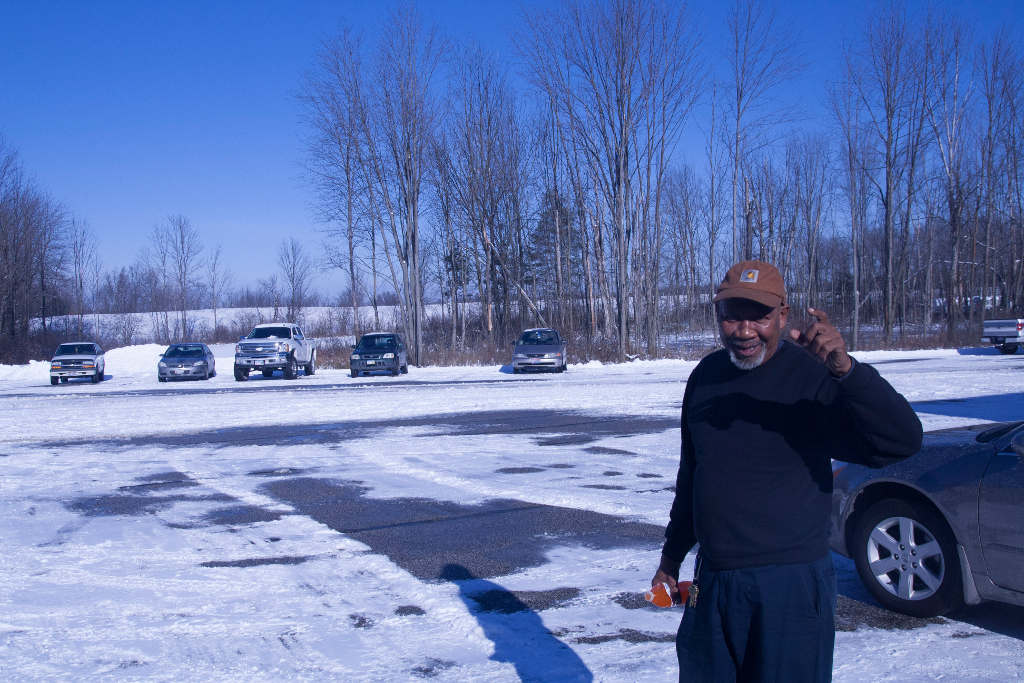 Will Blackmon
Will Blackmon 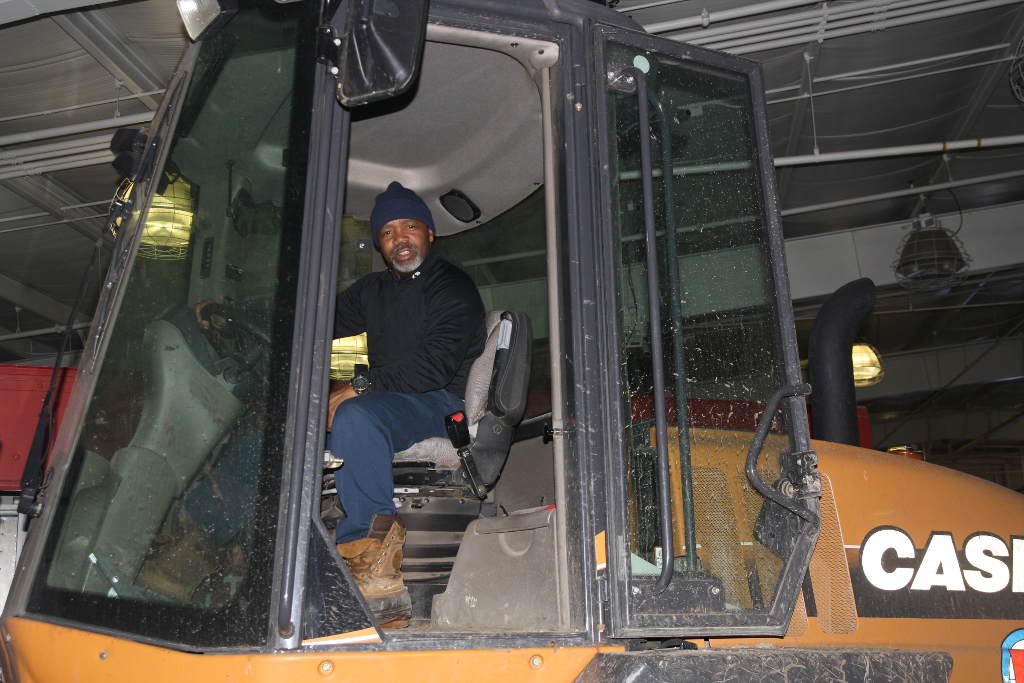 Johnny Moore
Johnny Moore
General Maintenance Department:
Will Blackman, Dave Spreng (not pictured), Johnny Moore, Steve Suvar (not pictured)
The workers of Oberlin’s General Maintenance Department are at the heart of our community, making sure the town runs smoothly in rain, snow, and sunshine alike. I spoke with Will Blackman, Dave Spreng, Johnny Moore, and Steve Suvar about their work and lives in Oberlin.
Q: What words or images would you use to describe Oberlin?
Will: Nice place to live, nice environment, small town with small town atmosphere. More in depth about social rights, green living all that kind of stuff that other cities are just starting to worry about.
Dave: I think Oberlin is diversified… and state of the art really, we always try to stay cutting edge.
Steve: College town, not wanting to grow like other communities because we try to keep a lot of the industry out. Making sure things stay grassroots.
Johnny: Unique – the different makeup of individuals that come together in the community. It attracts different people from other locations, which allows residents to interact and get to know different types of people.
Q: Some people use the word “sustainability to mean actions that enhance/maintain the economic, environmental and social welfare of the Oberlin community.” What does sustainability mean in your life?
Johnny: Being able to use resources, and yet not to take away the opportunity for others to use those same resources. We don’t want to do something that damages the environment to a degree that no one else can come and use that resource after you. We should consume natural resources adequately so others can use them. Sharing and working together to conserve, as a community.
Dave: Sustainability to me overall… is saving the planet, and everybody has to have a part of that.
Will: Mak[ing] sure everything is in line. You want your life to be as suitable as it can be...You want to be able to do what you want to do without having to worry about anything interfering with it. You don’t want have to worry about something that would come and mess up your stability in terms of the environment. A community that provides security.
Q: What actions are you engaged in that relate to sustainability?
Will: Plowing snow, I mean everything with the maintenance, it’s not automatic. And it’s a lot harder than what people think. We’re public servants. We handle the grounds work, the streets, the sewers.
Steve: Totally. I mean, we work with wastewater, we chip brush, suck up leaves, plow snow, fix storm sewers, clean sanitary… We pretty much do everything in the town dealing with environmental aspects.
Q: Any advice for your fellow community members regarding care for the environment/sustainable living respect for nature?
Dave: Well, especially being a garbage man, and being able to see the landfill firsthand, and knowing what a landfill is, and how important it is to keep certain materials out of the landfill…. I try to educate people. And also for recycling I try to steer people to be sustainable, to be able to reuse, renew, and do all that … and to me personally, I’ve always done that but I think that people don’t understand the environmental aspects of what the world is going to be in 25 years if they don’t do their share. And people get in this rut… its kind of like people who don’t vote…They think.. well what can one voice make a difference? But it can! Because if you have a normal family in Oberlin or any other city… you’re going to have kids, they’re going to have kids, and you may see 4 or 5 generations before you die. And with all those kids it may end up being a lot of people if you can influence them to recycle, re-use, and renew. Think about it, it takes a few families to make a big difference. But there is still a lot of people in Oberlin that just recycle plastic, and they think that’s recycling. When they should be doing newspaper, glass… I think they need to be more educated, to the fact of exactly what all you can recycle, and why you should and why it’s a responsibility. You know that’s why we make it free, so it’ll enhance people to do that…. Some of them still don’t…
I’d like to help them understand in some way how easy it is to recycle, and make people know how important it is. I get more kids to do it than parents!… because I use to go speak at schools, take my truck down there, and explain to them what recycling is all about…sometimes you have to get to the kids to get to the parents, because the parents were born in an era, where they really don’t care. People...think recycling is hard, because you have to put a couple buckets in your kitchen or whatever…I put one big container, and then I take it out and sort it in my garage, and I mean it doesn’t take any longer. And you know you don’t put all that stuff into the landfill. If people would understand that bottles take 125 years to decompose, and you’ve got a lot of beer drinkers here, college kids man, party houses… And college kids, they’re good about it, even the off campus houses… very good recyclers. ...if you could get these general people, the normal residents to understand that glass takes that long to break down…people whine about how big landfills are, but they’re not doing anything to make them smaller.
Johnny: What I would like to see is for people to be more conscious of the way we use our resources, so that whatever things we to do, it doesn’t create a negative impact for the ones that come after us.
]]>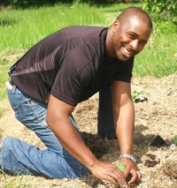 Alan Mitchell is Oberlin Community Services’ Food Coordinator and an active Oberlin resident, exemplary in his care for others. Alan grew up in Oberlin and after being away for a decade, during which time he attended college and serving in the Navy, he returned to raise his family in an environment he feels can teach his kids essential values.
Alan Mitchell is Oberlin Community Services’ Food Coordinator and an active Oberlin resident, exemplary in his care for others. Alan grew up in Oberlin and after being away for a decade, during which time he attended college and serving in the Navy, he returned to raise his family in an environment he feels can teach his kids essential values.
Q: What word(s) or image(s) would you use to describe Oberlin:
The words I would use are: Forward thinking. In terms of images, having grown up here, I always think back to the architectural piece, right there on the corner of professor and college: It’s those railroad tracks that run directly into the ground that symbolize the Underground Railroad.
Q: Some people use the word “sustainability” to mean actions that enhance/maintain the economic, environmental and social welfare of the Oberlin community. What does sustainability mean in your life?
Not losing ground, economically or socially in terms of the degradation of values and friendship networks, and also being able to re-instill the values that we’ve kind of lost in our society: conservation, recycling, composting.
Q: What actions are you engaged in that relate to sustainability?
We are actively trying to educate all of our clients so that they have a role in the local food system in terms of being producers as well as consumers. We are a zero waste partner and recycle all different kinds of products that come in.
We are also able to redistribute some of the wealth [in the community], because we use OCS as a space to donate items. Working primarily as a Food Distribution Coordinator I can tell you that usually most of the food that we get has not been planted with the intention of coming to OCS in order to redistribute to those in need*...It comes to us and we buy it within seconds, putting to use things that would otherwise not be usable. And we are able to help people to live by giving them those items.
*Stay tuned for Oberlin Community Services’ Plant an Extra Row campaign this Spring!
Q: Any advice for your fellow community members regarding care for the environment/sustainable living and respect for nature?
In the work that I do, just personally, the values that I think are important: I’d love for more people to care more about food and shelter, because they are things that may not be human rights but they are human needs, and they are things that we could probably do a better job at helping people to achieve, because these are our neighbors, these are our friends. Food is the area that I’m working in right now, and there’s a huge need, the social safety net is broken, and it’s not as if we’re going to fix that all by itself. We’ve got to recognize it and work at it, so it’s a challenge that we should take on.
]]>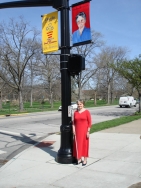 Barbara Pierce, an Oberlin resident and the first post-war blind student to attend Oberlin College, has worked for the last 40 years for the National Federation of the Blind, advocating for the civil rights of blind people. She is a leader nationwide as well as in the Oberlin community.
Barbara Pierce, an Oberlin resident and the first post-war blind student to attend Oberlin College, has worked for the last 40 years for the National Federation of the Blind, advocating for the civil rights of blind people. She is a leader nationwide as well as in the Oberlin community.
Q: What word(s) or image(s) would you use to describe Oberlin:
A: Friendly, conscientious, passionate, intense.
Friendly: I think small towns are friendly because there’s a greater amount of noticing and caring about what’s happening to people and the willingness to step forward and help by providing things such as transportation or making meals.
Passionate: I’m very involved with the civil rights of the blind. It’s a low-incidence disability. People don’t know about blindness; yet, when I get a forum to talk about the problems, I’ve got people revving up… they are horrified that people are earning 15 cents an hour in sheltered workshops, and they are ready to roll up their sleeves and do something about it. You can get people to care.
Intense: There’s always something bubbling away on the front burner, here. Like the intense desire to be in the forefront in being ecologically responsible. I take great pride in Oberlin and Oberlin’s willingness not to be irresponsible.
Q: Some people use the word “sustainability” to mean actions that enhance/maintain the economic, environmental and social welfare of the Oberlin community. What does sustainability mean in your life?
A: The ability to live in such a way that you can keep going, that you don’t tap out your resources, that you’ve got enough to carry on with.
We use to have little exercises years ago, in which for a week or a month we would undertake to live on what somebody living on welfare had to spend on food. So we ate hot dogs, bread, and canned fruit…. And it was exhausting and humbling…. And the kids drank reconstituted dry milk and hated it! But it was important to do it, and obviously we survived and we did okay with the exercise, and I knew that, if we didn’t have any more money than that, we could manage, but it wasn’t easy or fun. But we knew there was an end to the experiment, and that made it artificial.
So sustainability to me means that you can keep going with the effort, that it’s not so exhausting to put one foot in front of the other that you don’t have time to think of anything other than where your next meal is going to come from.
Q: What actions are you engaged in that relate to sustainability?
A: Well, we drive a hybrid car, and we made it clear to our kids that, if they wanted to drive hybrid cars, we would make up the difference in what it would cost them to buy a hybrid car. And Anne our daughter did do that. Bob walks everywhere, and of course, since I don’t drive, I walk everywhere also. And I see that as intentional conservation of gasoline.
We’ve got the curly light bulbs. I try to watch water consumption and hot water consumption. I wash my clothes in cold water. I have a Laundry Pure that ionizes the wash water to remove dirt, making detergent unnecessary.
We are pretty adamant about turning off lights and turning down the heat at night.
And I personally always keep the lights off.
Q: Equal rights is part of sustainability, I mean I don’t believe we can cater to a certain segment of the community and call it sustainability…We need to look at everybody joining together. And I think that the work that you’ve done as a leader, to help people become integrated into society so they are treated as an equal person…Can you speak about what you’ve done there?
A: “Well since 1974 I’ve been active with the National Federation of the Blind, which is a consumer rights organization, and it really is aimed at precisely what you talk about: equal justice, equal rights. There is a tendency to wrap disabled people in cotton batting and put them safely up on the shelf, so they won’t get hurt and won’t get in people’s way…So partly what I do is to insert myself and get in people’s way.
My children were highly insulted at the way people stared at me because I use a long cane when I walk. They constituted themselves “the stare-back contingent.” I couldn’t see people staring at me, and of course the way you get people to stop staring is to stare back at them. So they simply denominated themselves as the people to stare people out of countenance and made them stop watching…That was good for them, they needed to do that.
I remember once I was walking down the street with Marky in a backpack and Anne was riding a tricycle in front of me. I called to her to stop at the corner, and she did. A man was there lecturing her about how she had to be careful to take care of me. She was three; she had not the least notion of what he was talking about…But this tells you about the presumption that being equipped with vision gives one control, power over somebody else. People ask me why I don’t use a dog, and I tell them because I’ve never met a dog that is as intelligent as I am. I know I couldn’t trust a dog because I want the full force of intelligence to make decisions about whether the traffic is stopping or the light has turned or whatever it may be.
I’m always pushing on societal expectations of blind people and what is fair treatment. We have a 70% unemployment rate, and that’s not because 70% of us are incapable of holding down a job. It’s because people don’t believe that we are capable. They say, “I can’t afford to release someone to take you to the bathroom.” Umm, who asked you to take me to the bathroom? I mean, how do you think I got to this employment interview?
So I am always, always pushing the social norms, the social expectations. I value the seven years I worked for Oberlin College because I was in the face of every alum coming back here. Every time I planned a reunion and competently got the paperwork done, and dealt with the problems facing reunion-planning committees, I reminded them that blind people are able to function independently, and who knows what effect that may have had on their hiring practices. Jobs are key to equality. Once you give a person a job, then you give them the right to economic independence.
Q: Any advice for your fellow community members regarding care for the environment/sustainable living respect for nature?
A: I wish people would put a blindfold on and walk along the sidewalk in front of their houses and notice how rough the pavement is and how many low hanging branches there are. There have been times when I’ve been particularly annoyed and I have carried clippers with me, and, when I hit something with my head, I simply clip off the branch and leave it lying on the sidewalk. Being mindful of these things, it would be a courtesy to all walkers, but especially to the blind. There are several of us in town now. People don’t pick up their feet, which is what you have to do with these uneven sidewalks…
This is inspiring to really appropriately transmit what environmental justice means… because sustainability is suppose to be the balance between economy, environment, and social justice, but social justice gets the short end of the stick.
A: Well that’s because there’s a bunch of people who have social justice. But everybody can benefit from a better economy and a better environment. We all benefit if we lower the carbon footprint of the community, but social justice, there a lot of people who have theirs, and they don’t think of how fragile that can be. All it takes is a stroke or a fall for it to be gone.
Think about appliances. Try to find a stove that a blind person can operate: you can’t do it. And that’s not because it’s harder or wildly expensive to make, but because design has gone the direction of smooth and sleek, flat panels, LED controls.
I get calls all the time: “How can I help my mother dial the telephone better? She can’t see the numbers on the telephone anymore...How can I get this fixed for her?” Really, there aren’t good solutions.
It’s not for nothing that people refer to the able bodied as the temporarily abled. You live long enough, and you start losing your capacities.
Universal accessibility should be build-in everywhere.
]]>
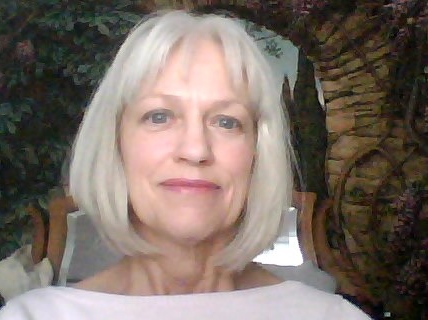 Lisa Kavanagh is a retired Oberlin resident with a rare mitochondrial disorder caused by Lyme disease who is passionate about influencing change towards a sustainable future. Although she only has a few hours of energy a day, she is very active through online forums, writing letters, and making environmentally conscious consumer choices. More than anything she makes sure she starts with herself, nurturing a holistic philosophy with the natural environment.
Lisa Kavanagh is a retired Oberlin resident with a rare mitochondrial disorder caused by Lyme disease who is passionate about influencing change towards a sustainable future. Although she only has a few hours of energy a day, she is very active through online forums, writing letters, and making environmentally conscious consumer choices. More than anything she makes sure she starts with herself, nurturing a holistic philosophy with the natural environment.
Q: What word(s) or image(s) would you use to describe Oberlin:
A: Oberlin is like a microcosm of people, a collection of people with so many different backgrounds, coming together in a peaceful way. I think that we are people who are progressive, who want a better world, that want to live in a better place.”
Q: Can you elaborate a little bit?
A: From a social perspective, from the environmental perspective, and the humanitarian perspective, Oberlin works toward the betterment of society.
Q: How is it that you came to live, work, educate/or be educated, play, or establish a business in Oberlin?
A: My sister lived here for about 20 years, we were both on the East Coast in Connecticut. When she moved out here, I’d come and visit, and fell in love with it. There was some sort of creative energy that I would feel, a sense of peace, serenity, that I didn’t feel on the east coast, with everybody rushing and everybody out to make a dollar, fighting for parking spot, hours on I-95 trying to get to work when its fifteen miles away. It’s just crazy. And when I came to Oberlin, I felt I could breathe. I ended up moving out here, my mom had moved out here as well, so I wanted to be close to my family.
Q: Some people use the word “sustainability” to mean actions that enhance/maintain the economic, environmental and social welfare of the Oberlin community. What does sustainability mean in your life?
A: The same. It's a constant chore, I shouldn’t say chore, labor of love…to maintain sustainability in every aspect of life. It's a balance when you have a group of people working towards that in all aspects of their life, because we are little environments ourselves. On the cellular level, what’s going on in here depends on what’s going on out there in the world. So maintaining homeostasis is a constant effort.
Q: What actions are you engaged in that relate to sustainability?
A: I’m an activist from my computer. As far as conservation, the products that I use at home are either things that I’ve made or things that don’t disturb the environment. Cleaning stuff… for example, vinegar and water. Natural. Nothing artificial. Nothing artificial goes into my body.
Q: Can you elaborate a little bit on that too?
A: I make my own shampoo. Cleaning solutions – vinegar and water. That’s all you need, you don’t need all the sprays and stuff like that. I like to think that whatever I put down my drain, I might be drinking some day. Because if you look at it from that point of view…. you really have to hold yourself accountable for how you use your water. I kind of wish that was the way it was, we were all given a supply of water and it was only up to us to maintain. Some people would just destroy it, just like they do their bodies. Other people would just take really good care of it. I have a rare disorder, in my mitochondria. The mitochondria are the powerhouse of every cell, so that means it’s where all your energy is produced. So conserving energy, is really personal to me, I have this much a day and I have to use it in a right away, or everything begins to slow down, heart….other organs. If you look at what we have here in terms of energy, we only have so much, use it to the best of your ability, think about it everyday, and I try to do that, in the way I live, I try to not be excessive.“
Q: You’re doing this for yourself?
A: I have to. When you think about the stress eating something with pesticides has on your body that stress depletes you of energy.
Q: Are you a big advocate for organic foods?
A: Absolutely. Our soil is living, it’s alive, and it’s a life. If we kill it, it’s our fault, and we’re supposed to be stewards, it’s our job.
You know our practices haven’t done service to the soil at all. We’ve gone from 21 inches of topsoil to barely 4 inches in some parts of the states.
My sister and her husband in Pennsylvania are organic farmers, so I’ve seen how it can be done, how it can be done cheaply. With raspberries for instance, for mulch they use sheep wool because it doesn’t break down, it’s organic, and it keeps the weeds and pests out. So it's a pretty amazing process. I’ve learned a lot from them, from what it means to conserve. They intern organic farmers, and take them to farmer’s markets. And when you see it working, you know it’s possible, it looks so overwhelming from the outside, but it’s so doable.
Farming has changed a lot now…
Yet farming is not for dummies, it takes a lot of organization, planning. I mean, it’s incredible the time that’s involved. People don’t realize what’s involved, they think it’s simple planting - they’re like, “What’s the big deal?” Like the perennial flowers so many people plant in their gardens; we don't know how they were grown, if they are GMO, and that's a huge concern.
Three concerns that I have for our planet and I think they’re doable… I don’t think that it’s too late. One is cleaning our air, we’ve got to know the truth, about what goes in our air, and that we’re not being told, there is no transparency. These are just basic things to sustain. Second, we need pure water. Why are we putting fluoride in our water? It is poison. Third is growing healthy food.
It’s unreal that people are trying to control water too!
Absolutely, and there’s a huge monopoly around who owns the water. It’s like a crazy cartoon that you would laugh at, if it weren’t true.
These are the topics I advocate for online. I sign petitions and write letters to senators and congressman about things that I see going on, or that I hear. After reading articles of concern, even if I have no energy to get out and do, I can sit in my bed and do this, and spend little energy, and feel like I’ve accomplished something.
Q: Any advice for your fellow community members regarding care for the environment/sustainable living respect for nature?
Start with yourself, start with your own world, in your own body. Tai chi, qigong, meditation, increased awareness of what goes on with your body, how you keep yourself. What you’re giving yourself will eventually trickle out to everything around you, and you will begin to have more respect for the environment. Start from the inside and move out. Look within first.
Also, I really believe that it would be great if the city of Oberlin would allow everyone to have maybe two chickens or a couple rabbits in their yard just so one can get the idea of what farming is like, what sustainability is like. How they interact with each other, having chickens with bees for instance.
I think there’s a disconnection, and it’s not a healthy disconnect, because if you look where it leads, that’s where the troubles start. The disconnection is with our mother, Earth. If we disconnect from her we all lose out.
]]>